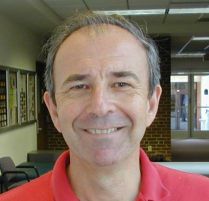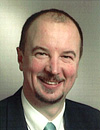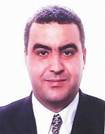Ericsson AB
The Virtualization technologies are maturing fast and finding applicability also outside the IT Datacenters - where the trend started. The Network Function Virtualization initiative as started by a group of Telecom Operators is an effort to define how virtualization could be utilized in the Telecom domain. In this talk I will discuss the opportunities for Telecom operators to leverage virtualization technologies both for more efficient operations as well as a vehicle for service innovation and revenue growth.
 |
Jan Söderström is head of the new Product Line for Cloud System within Ericsson, with the charter to build a carrier grade Cloud system for operator private and public clouds. In this capacity he leads the Ericsson strategies and product plans for Cloud Management, Cloud execution environment and Cloud Infrastructure. He previously led Ericsson’s worldwide IP and Cloud research, with eight research groups in six countries. He developed the companies SDN and Cloud (OpenStack) |
| strategies during a three year assignment in Silicon Valley. Jan has 25 years of experience of telecom and IP working in different roles mostly at Ericsson. He holds a Ph.D. in Applied Physics. | |
Chair of the IEEE ComSoc Technical Committee on Communications Software
This presentation will focus on a new hot topic on e-health technologies considering mobility environments and mobile technologies: Mobile Health. Information and communication technologies have rapidly grown in the few last decades along with mobile Internet concept of anywhere and anytime connection. In this context, Mobile Health (m-Health) proposes to deliver healthcare services, overcoming geographical, temporal and even organizational barriers. Pervasive and m-Health services aim to respond several emerging problems in health services, including, the increasing number of chronic diseases related to lifestyle, high costs in existing national health services, the need to empower patients and families to self-care and manage their own healthcare, and the need to provide direct access to health services, regardless of time and place. This keynote speech will address the most relevant contributions for healthcare and e-health systems, focusing on the mobile health revolution and evolution. The top and more used m-health applications in the mobile market and several ongoing works will be presented. Trends and insights on future research works are also considered.
 |
Joel Rodrigues is a professor in the Department of Informatics of the University of Beira Interior, Covilha, Portugal, and researcher at the Instituto de Telecomunicaçoes, Portugal. He received a PhD degree in informatics engineering, an MSc degree from the University of Beira Interior, and a five-year BSc degree (licentiate) in informatics engineering from the University of Coimbra, Portugal. His main research interests include sensor networks, e-health, e-learning, vehicular delay-tolerant networks, and mobile and ubiquitous computing. He is the leader of NetGNA Research Group |
| (http://netgna.it.ubi.pt), the Vice-chair of the IEEE ComSoc Technical Committee on Communications Software, the Vice- Chair of the IEEE ComSoc Technical Committee on eHealth, and Member Representative of the IEEE Communications Society on the IEEE Biometrics Council. He is the editor-in-chief of the International Journal on E-Health and Medical Communications, the editor-in-chief of the Recent Patents on Telecommunications, and editorial board member of several journals. He has been general chair and TPC Chair of many international conferences. He is a member of many international TPCs and participated in several international conferences organization. He has authored or coauthored over 250 papers in refereed international journals and conferences, a book, and 2 patents. He had been awarded the Outstanding Leadership Award of IEEE GLOBECOM 2010 as CSSMA Symposium Co-Chair and several best papers awards. Prof. Rodrigues is a licensed professional engineer (as senior member), member of the Internet Society, an IARIA fellow, and a senior member of ACM and IEEE. | |
EEE Dept., Imperial College London, UK
ICT is becoming one of the main culprits for CO2 emissions, already on a par with air travel since 2007. Energy consumption by ICT is estimated to increase by 4% a year, despite the increasing energy efficiency of electronic and computer equipment, due to the ever increasing usage of computers and telecommunications. On the positive side, ICT offers the potential to manage energy more efficiently, help better match energy supply and demand, and dynamically substitute renewable energy sources in the place of fossil fuels. At the same time, one would like to think that ICT is saving energy and CO2 emissions in other areas (such as transport), by substituting on-line activities for physical activities, such as working at home rather than commuting to an office. But such trends are difficult to identify, while the recent economic crisis in Europe and the USA has definitely had an impact on energy consumption in industry and other fields of activity. Within ICT itself, communications represent close to 25% of energy consumption, with data centres accounting for another 20% or so, the rest being attributed to PCs, terminal devices and office equipment including local networks. This lecture will focus on the ICT aspects of energy consumption from a performance engineering perspective, and show how some of our established methods, with measurements, can be used to understand the trade-offs between QoS and energy consumption, and help reduce the energy consumption in servers and networks.
 |
A Fellow of IEEE, ACM and IET, and an expert on the performance evaluation of computer systems and networks, Erol Gelenbe is the Professor in the Dennis Gabor Chair in the Department of Electrical and Electronic Engineering at Imperial College, London. His research has been incorporated into commercial software tools such as QNAP for system performance evaluation and FLEXSIM for manufacturing systems. He has invented new mathematical models for performance analysis such as G-networks and |
| diffusion approximations, and designed the first random access fiber-optics network XANTHOS and the first multi-processor packet switch SYCOMORE. He currently coordinates the EU FP7 Project NEMESYS on mobile network security, and also works on the interaction between energy savings and performance in Cloud Computing and ICT. Erol is a Fellow of the French National Academy of Engineering, and of the Hungarian, Polish and Turkish Science Academies, and has won the ACM SIGMETRICS Life-Time Achievement Award (2008), and IET’s (UK) Oliver Lodge Medal for his work. | |
Next Generation Networks (NGN), including Next Generation Access (NGA), IP Multimedia System (IMS), Long Term Evolution (LTE), etc. are the base for further electronic communications market development. National regulatory bodies have to accelerate the investments in the new technologies within their areas of responsibility. Croatian Post and Electronic Communications Agency (HAKOM) has contributed to increase of investments in Croatian electronic communications market by means of regulatory decisions, award of “digital dividend” and technology neutral licences for radiofrequency spectrum, state aid program for broadband development in rural areas and by the project “Looking to Future”. Fully alignment to the new EU regulatory framework a long time before accession date to EU has been one of significant preconditions for swift and successful incorporation of Croatian electronic communications market into EU “Single market”.
 |
Dražen Lučić is the president of Croatian Post and Electronic Communications Agency (HAKOM) Council since 2013. Previously served as HAKOM’s Executive Director from 2009. Before joining HAKOM, Mr. Lučić worked at Ericsson in Croatia, Western Europe and Israel at R&D department for more than 20 years, rising from engineer in R&D department to senior sales director of one of the global telecommunication networks operators. Speaks English, German, Spanish and Swedish. |
We are witnessing in recent years a rapid development of interconnecting applications. In addition to those that contributed to the popularity of the early Internet (e-mail, file transfer, etc.), there are now applications that rely on network data more sensitive. They include sound applications (voice, music programs, etc.), image applications (television programs, videoconferencing, video on demand, etc.) and urgent information applications (market orders). However, it is important for the operators and providers not to forget sight of the reason for this new infrastructure: to provide network service that user wants to use. Accomplishing this idea means assuring positive experience of end users. Therefore, service providers are switching the focus from traditional Quality-of-Service (QoS) to user satisfaction, which is the overall success of a network from the user perspective. The perceived end-to-end quality becomes one of the main goals required by users that must be guaranteed by the network operators and the Internet service providers, through manufacturer equipment. This is referred to as the quality of experience (QoE) notion that becomes commonly used to represent user perception. This presentation will focus on a vision of a new paradigm which make interactions first-class objects from the perspective of the user, the application and the network components. This is achieved by analyzing the interaction between the user and the application with quality perception metrics which are used to fix the control/command chain in network components. The idea here is how to integrate these metrics into a control/command chain in order to construct a network system? This keynote speech will address the design of an adaptive loop for improving the service quality of a network system by taking into account the end-user feedback. In this keynote, we focus on two main mechanisms for a Content Delivery Network Architecture: routing and server selection function.



